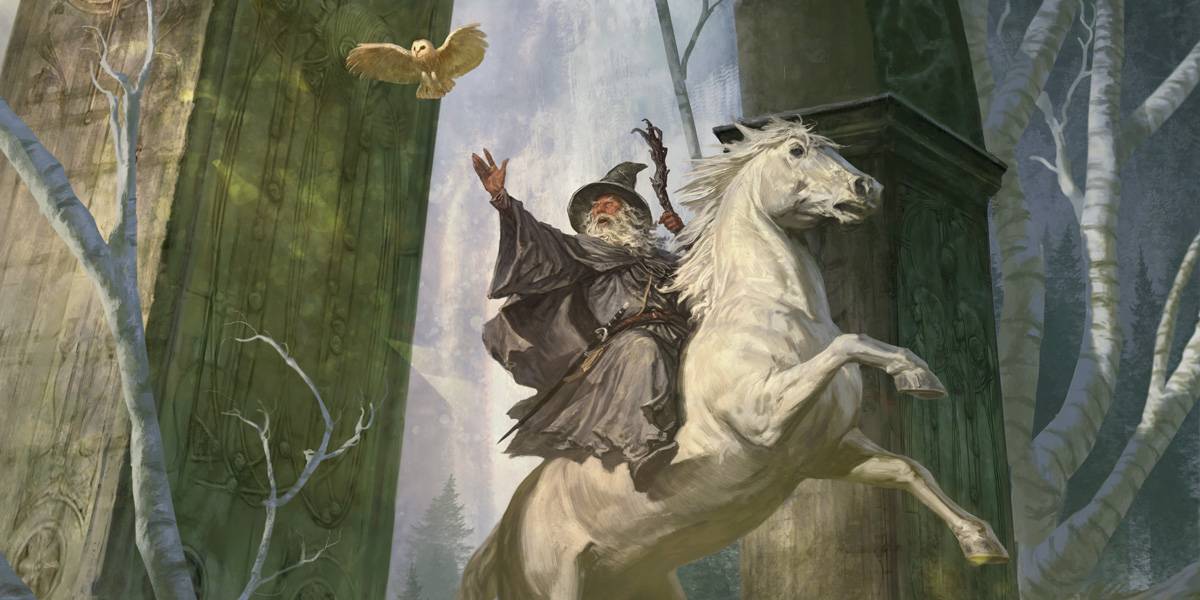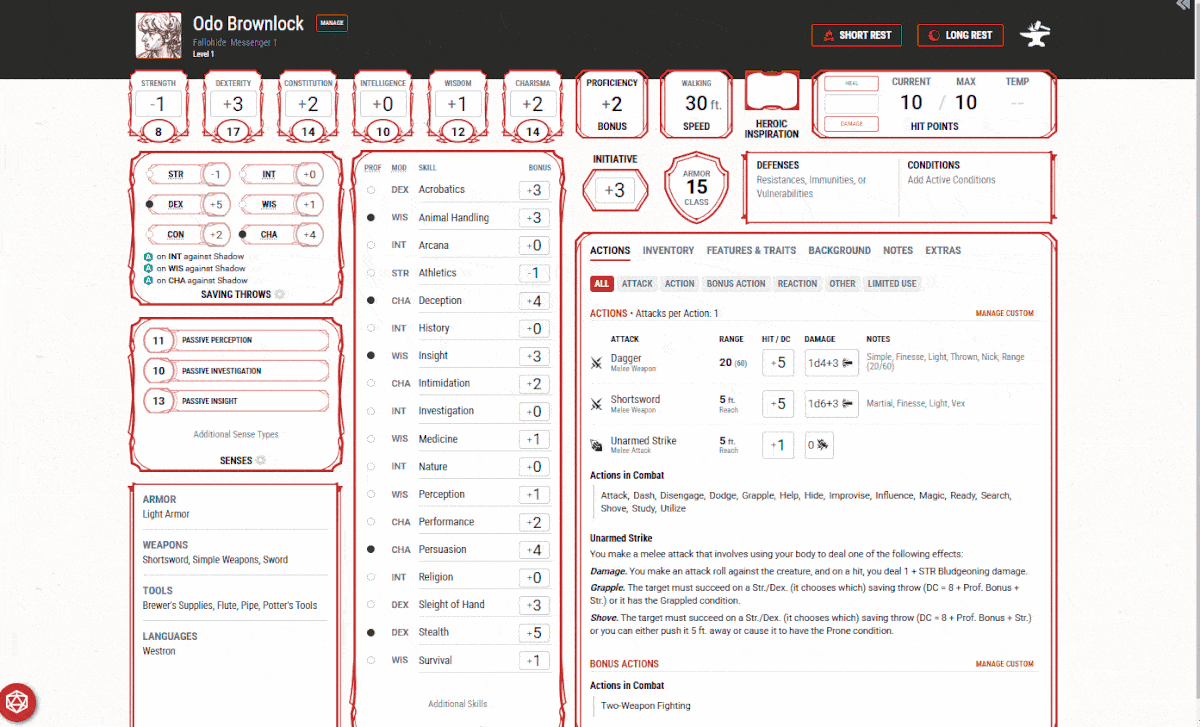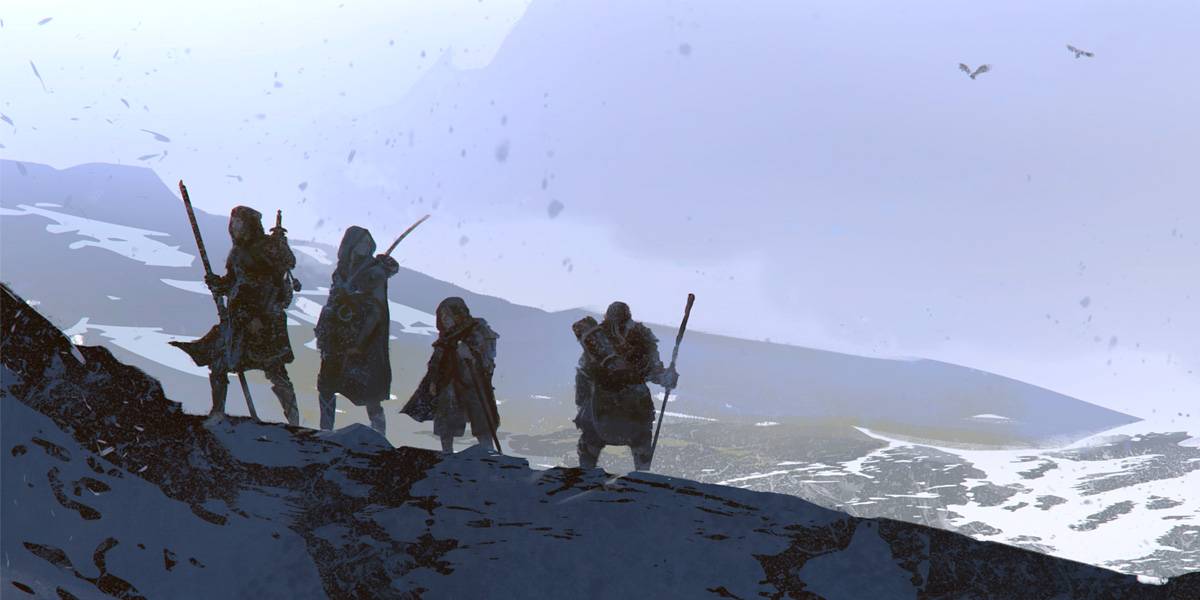It’s a dangerous business going out your door, and Free League Publishing’s The Lord of the Rings™ Roleplaying will prove it! Now on D&D Beyond, the legendary world of J.R.R. Tolkien has been adapted for fifth edition Dungeons & Dragons, including new rules for characters, setting information, monsters, and more!
Let’s explore what this volume contains and how it gives you everything you need to bring Middle-earth to life at your table!
What You’ll Find in The Lord of the Rings Roleplaying
This digital volume contains the following, all of which are designed to evoke the grounded yet epic spirit of The Lord of the Rings in your games:
- 6 Callings (the equivalent of D&D classes)
- 6 Heroic Cultures of Middle-earth (a combination of D&D species and backgrounds)
- 6 Rewards (traits that improve gear)
- 42 Virtues (the equivalent of D&D feats)
- 22 new monster stat blocks
- A full setting guide to Eriador in the Third Age
- 6 Patrons (including Gandalf!)
- New rules, including Shadow points, Councils, Journeys, and more!
All of the maps and tokens from this volume have been integrated into D&D Beyond’s toolset, so you can save time planning encounters, searching for information, or rolling up characters ready to adventure in Middle-earth!
Welcome to Middle-earth

Tolkien’s world of Middle-earth is ripe for adventure, with an ocean of deep lore, compelling geography, interesting politics, dangerous foes, and plentiful secrets.
All of the history of Middle-earth would be impossible to fit into a single tome, so The Lord of the Rings Roleplaying takes players to one of the most recognizable times and locations amongst fans: Eriador in the Third Age.
Eriador in the Third Age
The Lord of the Rings Roleplaying is set in the year 2965 of the Third Age, just 20 years after Bilbo’s perilous journey to the Lonely Mountain and roughly 50 years before Frodo first steps out his door with Sam and the One Ring.
In this volume, you’ll explore Eriador, the northwest region of Middle-earth, which is home to familiar locations, such as the Shire, the Grey Havens, Rivendell, Moria, and Bree-land. It is a wide expanse that’s not fully explored in The Lord of the Rings book trilogy or movies, leaving plenty of room for undiscovered adventures.
You’ll encounter various servants of the Shadow, uncover ancient secrets, and, if you’re lucky, run into some familiar friendly faces.
Patrons
One of the ways you can interact with Middle-earth’s more esteemed individuals is through the Patron mechanic. Some extraordinary folk have already begun the fight against the Shadow and have managed to amass the power and influence to aid our heroes. If their goals align with the party’s, these Patrons may take the heroes under their tutelage, giving them a number of benefits.
The Patron examples in this volume range from Bilbo Baggins to Gandalf the Grey and even Tom Bombadil–each of whom has a unique influence and grants advantages that can shape your journey.
The Rising Shadow
In the timeline covered by the setting, darkness has crept back into the world. While your heroes may not be confronting the Dark Lord Sauron himself, they will undoubtedly come across his deadly servants, like Evil Men, Orcs, Trolls, and Wraiths.
Throughout their adventures, your heroes must contend with these forces and the Shadow that burdens their souls. Characters can gain Shadow points, and if they accumulate an amount equal to their Wisdom score, they will suffer permanent, detrimental effects. While certain experiences and foes may make a hero gain Shadow points, they can be reduced during a Fellowship phase.
A Fellowship of Heroes

While adventures are dangerous and can make you late for dinner (or get you killed), they are the heart of every great story. Some folk are born with a spark that drives them out their door, and others have adventure thrust upon them.
In The Lord of the Rings Roleplaying, characters may feel more grounded than their typical D&D counterparts, as magic is subtler in Middle-earth. Additionally, Callings (similar to classes in D&D) only go up to level 10, ensuring that players are in for a grittier adventuring experience.
Callings
Callings represent the features a character has access to, as well as their virtues and beliefs.
The Lord of the Rings Roleplaying includes six Callings:
- Captain: A charismatic fighter who leads his fellows in battle.
- Champion: A vigorous warrior and weapon-master.
- Messenger: A swift courier with a knack for negotiation.
- Scholar: A studious, learned individual with knowledge so profound that it approximates magic.
- Treasure Hunter: A quick, nimble, and cunning burglar.
- Warden: A roaming sentinel who guards against the Shadow.
Heroic Cultures
The diverse folk of Middle-earth each have their own histories and hardships. But when adventure calls, those who answer can carve their names into legend—whether they are the descendants of great heroes or simply find themselves in the right place at the right time.
The six Heroic Cultures found in The Lord of the Rings Roleplaying are as follows:
- Bardings: Followers of King Bard and hardy survivors of Dale.
- Dwarves of Durin’s Folk: Stout warriors and craftsmen from under the mountains.
- Elves of Lindon: Immortal guardians of Middle-earth’s fading splendor.
- Hobbits of the Shire: Humble and small-sized folk with surprising bravery.
- Men of Bree: Sturdy and independent dwellers of Bree-land.
- Rangers of the North: Mysterious wanderers and exiles of a fallen kingdom with a duty to protect.
New Rules for Adventuring in Middle-earth

Whether your heroes are creeping through a dark forest, negotiating with a powerful faction, or catching up on some well-needed rest, The Lord of the Rings Roleplaying features custom rules that make gameplay feel distinct from the fifth edition of D&D:
Journeys
Perilous and spanning travel sequences are oft associated with Middle-earth, and they are vital to gameplay in The Lord of the Rings Roleplaying. The volume provides in-depth rules for journeys across the rugged, wondrous lands that stretch between bastions of civilization.
These rules are designed to make travel an integral part of every adventure, with the goal of immersing players in the wild landscape of Eriador. Characters must plot their intended path carefully, for example, avoiding crossing dangerous, swift-running rivers without bridges, and cannot dare to climb high-mountain ranges unless they know where passes are located.
Traveling in the game can be dangerous. You never know what might await heroes who venture into the wilderness. These uncertainties take the form of events that can fatigue the party and cause Exhaustion.
Councils
Social interactions of utmost importance have new rules in The Lord of the Rings Roleplaying, where they are referred to as Councils. These rules are used to simulate intense discussions between two parties that can have long-lasting ramifications.
This system includes a variety of phases in which the party needs to succeed on skill checks to convince their audience to heed their plight. The checks are made more difficult if their audience is at odds with their purpose, and things can turn out badly for parties found to be dishonest or outrageous in their requests. Think of what might happen should your heroes ask Elrond Halfelven for help, or Tom Bombadil!
Fellowship Phases
A Fellowship Phase is the downtime between adventures and can last days, weeks, or an entire season. This is the time provided for heroes to rest, reflect, and regain their strength before the next adventure.
During these phases, characters can choose from a number of undertakings that will provide lasting benefits. They can study maps, write songs, or just focus on easing the Shadow’s weight on their spirit.
It’s Time To Go on an Adventure!
The Lord of the Rings Roleplaying is now available on D&D Beyond and has been integrated with D&D Beyond’s suite of digital tools. With these aiding your quest, you can easily plot your travel with Maps, seamlessly search for content in the compendium, and roll up a hero with the Character Builder!
Will you strike out to find the remains of Annúminas and the secrets it hides? Maybe you’ll escort a Hobbit farmer along the rough roads of the Bree-land to the Inn of the Prancing Pony? Or perhaps you’ll find some good in this world that’s worth fighting for, no matter the cost.

Mike Bernier (@arcane_eye) is the founder of Arcane Eye, a site focused on providing useful tips and tricks to all those involved in the world of D&D. Outside of writing for Arcane Eye, Mike spends most of his time playing games, hiking with his girlfriend, and tending the veritable jungle of houseplants that have invaded his house.








-
View User Profile
-
Send Message
Posted Nov 27, 2024I think you missed the point of why this book exists.
The PCs in this book aren't fighting Morgoth one on one, or even Sauron, they're dealing with ghosts, werewolves, trolls, orcs, goblins and other people. That's what adventuring on Middle Earth looks like during this time.
-
View User Profile
-
Send Message
Posted Nov 27, 2024Don't buy this for the classes, they're the classes we already have with different names — Slayer is the Barbarian, Treasure Hunter is the Rogue, Wanderer is the Ranger, Warden is more or less the Bard, and Warrior is the Fighter. The Scholar might be the only unique class.
What LeifSA said about class levels must be a limitation on D&D Beyond's end, because in the books all classes can level up to 20 as expected. It has nothing to do with Middle-Earth being a low-fantasy setting, as Cezmi suggested.
I was lucky to already own all PDFs from this setting so I could check if it was worth having on D&D Beyond as well. I'm really unsure.
-
View User Profile
-
Send Message
Posted Nov 27, 2024This. They never finish anything. Remember the Generic Feature System? Adam was still in the team when they started that. Homebrew is still a hot incomplete mess.
I'm certain that the acquisition by Wizards has further shifted the focus to shipping new content instead of fixing what they have or finishing what they started.
-
View User Profile
-
Send Message
Posted Nov 27, 2024Sync your purchases in the settings tab if you cant access it.
-
View User Profile
-
Send Message
Posted Nov 27, 2024For those wanting to buy it be aware, I've finally got access and the character builder IS NOT suited for this book at the moment.
I can't select proficiency in things like Explore or Riddle.
I still need to select a background even though the backgrounds are built into the species.
Many of the starting options do not match what is said in the book.
For the price paid, I'd have expected the character builder to have been arranged to fit the style of creation, it is not.
The character sheet also remains the same with no available tracking of any other aspects like shadowpoints.
If you're buying it for the character builder ease of creating a character, just be aware there will be things you need to manually add or remove at the end of the process.
Like many, the character builder is the reason I bought the content as the PDF is cheaper elsewhere. Unimpressed.
-
View User Profile
-
Send Message
Posted Nov 27, 2024I didn't miss the point. It's just an incomplete, poor setting.
-
View User Profile
-
Send Message
Posted Nov 27, 2024is it compatible with dnd 5e? or is it a setting only kind of thing
-
View User Profile
-
Send Message
Posted Nov 27, 2024It seems compatible, theres just different names for things and a few new mechanics to pay attention to. Just the character creator doesn't seem to integrate well.
-
View User Profile
-
Send Message
Posted Nov 27, 2024No! That is such an unfinished mess. Trust me. As someone who has used it quite a bit, it is not worth it. Steamforged needs someone to fix it. So many things are just wrong, missing, or balanced like a watermelon n a golf ball.
-
View User Profile
-
Send Message
Posted Nov 27, 2024This is so awesome. I've been reading the rules since I bought it yesterday and I can say this is not just a reskinning of 5e, they made mechanical changes to really capture the themes present in LotR. I sincerely hope they continue to add the supplements to DDB.
For people saying they cannot access it: this uncharacteristically took a few minutes, but then it was there. I was worried for a minute, but now I am guessing maybe it was high volume or just a server issue? But its all good now.
-
View User Profile
-
Send Message
Posted Nov 27, 2024Lord of the Rings Roleplaying Game 5e is very different from DnD - its a bit tricky to implement in a game through dndbeyond. Specifically, in character creation a LotR5e character can't pick the usual classes and is supposed to only use those available in that rulebook. Is there a way to turn off the Core Rules in character creation to simplify this for my players?
-
View User Profile
-
Send Message
Posted Nov 27, 2024Thank you for posting this. This was exactly why I was thinking of purchasing this and was concerned they wouldnt have the new skills, cultures, etc. that is in the book as it will definately alter the standard character record sheet.
-
View User Profile
-
Send Message
Posted Nov 27, 2024Not quite. Those books you're talking about were by Cubicle 7 and went up to level 20 for PCs. These are the Free League books, and they top out at level 10. You could probably adapt the things that don't carry over, but it wouldn't be a drop-in fit, so to speak.
-
View User Profile
-
Send Message
Posted Nov 27, 2024As the authors suggested. They've expressed the journey for these PCs ends at 10 because past that they're worn from the experience of adventuring in this setting; quite literally highlighting these characters aren't intended to be first age godlike adventurers taking swings at Morgoth himself.
By design these characters are meant to retire at 10th level because adventuring on Middle Earth is physically, mentally and spiritually exhausting.
-
View User Profile
-
Send Message
Posted Nov 27, 2024There several differences in the character sheet nothing to do with Shadows, some different Skills etc. Where the Fellowship points, information on Patrons which is needed, will there be a new character sheet designed for the game, to be added.
There are also 5 expantions. Shire™ Adventures 5E to Keepers of the Elven-rings, (which are the same as The One Ring Starter Set to Realms of the Three Rings). What's the point of a core rule book when you need at least Shire™ Adventures to play a decent campain.
-
View User Profile
-
Send Message
Posted Nov 27, 2024Can't find it to purchase it.
-
View User Profile
-
Send Message
Posted Nov 27, 2024Do we know if they plan to allow for LOTR character creation in the Character Builder?
-
View User Profile
-
Send Message
Posted Nov 28, 2024This is great, and I look forward to my first game with the new system.
I've noticed a few things:
* The players in my campaign can't access the LOTR options
* The new skills aren't present
* There is no place to record Shadow points on the character sheet
* There is no place to record Virtues
-
View User Profile
-
Send Message
Posted Nov 28, 2024Free League huh, i wonder, will Dragonbane also be added to DnD beyond?
-
View User Profile
-
Send Message
Posted Nov 28, 2024No clue, but it would be better if DDB added an option to turn books on and off rather than publishers.
Being able to turn off the 2024 rules or the 2014 rules or only have the LOTR options available for characters would make things a LOT easier.
Then maybe a reskin of the character sheet made for specific books/settings like LOTR.
They havn't really thought it through at all.